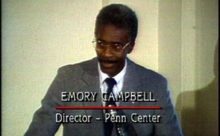Reflections on Sierra Leone
Originally from Washington, D.C., Dr. Myrtle Glascoe has lived in Charleston, South Carolina, since 1985, when she came to the College of Charleston to help establish the Avery Research Center, an archives and museum focused on the history and culture of South Carolina African Americans. She received her bachelor of science degree from Howard University, her master's degree from the University of Pennsylvania, and her doctoral degree from the Harvard University Graduate School of Education. She is currently associate professor of Educational Foundations for the College of Charleston. Her wealth of knowledge and commitment to the West African-American connection is substantial. Nothing quite prepared her, however, for her first trip to Africa in 1989 as part of the Gullah delegation profiled in Family Across the Sea.
"All through my life I've known about Africa, or, at least I thought I knew. And, of course, at different stages of my career, my knowledge has become greater. When I was a child, I knew we were black—that our people had been enslaved. But having the opportunity to actually be in the place that my ancestors may have come from—to be with people who may be blood-related...well," Dr. Glascoe fumbles for the right words, "it was almost overwhelming.”
"When we first arrived, after such a long plane trip, we were all exhausted. I was tired as a dog, thinking mainly of a hot shower and a good, long sleep. Instead, when the plane landed, there were over a thousand people there to meet us. It was an incredible kind of joy—something stirring and really touching that affected me deep down inside. To have that experience . . . well . . . nobody greets you like family."
During their travels throughout Sierra Leone, the delegation was greeted with this same enthusiasm everywhere they went. "When we were in Taiama, a small village in the up-country," she explains, "about thirty minutes prior to reaching the village, we saw that all along the roadside were school children, lined up and neatly dressed in their school uniforms, waiting for our bus to pass. We were in Taiama three hours, maybe more. When we left Taiama, the school children were still lined up along the road, waiting for us. Everywhere we went, we were met with this same heartfelt reception.
"Of course, I was aware of a different culture. There was a great deal of difference. But I was also aware of a common thread, a bonding, a connection that was the same. It was like I'd been away, away off somewhere and I was finally coming back. And it felt like homefolks. I knew, finally, that this was the place out of which I came."
